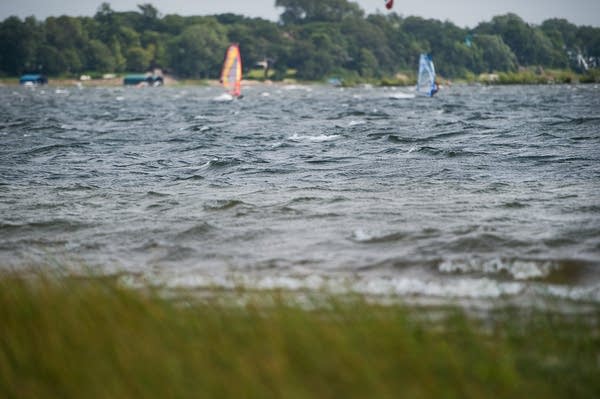Water rising again in White Bear Lake, but will it stay?

Water levels in White Bear Lake seem to be on the upswing after falling to a record low in early 2013. People who live near the northeast Twin Cities lake, however, remain concerned about its recovery.
Many still want state lawmakers to fund what they see as a long-term solution: a new water supply system that doesn't rely on an underground aquifer connected to the lake.
The lake remains in critical condition, said White Bear Lake Restoration Association Chair Greg McNeely.
After decades of population growth there are too many wells pumping too much groundwater out of the Prairie du Chien-Jordan Aquifer that's connected to White Bear Lake, he added.
Create a More Connected Minnesota
MPR News is your trusted resource for the news you need. With your support, MPR News brings accessible, courageous journalism and authentic conversation to everyone - free of paywalls and barriers. Your gift makes a difference.
"It's going out the bottom into the aquifer, McNeely said. "I really believe strongly that if we keep taking water out of the Prairie du Chien Aquifer it's not sustainable."
The lake hit a record low of 919 feet above sea level in January 2013 but was pegged at 922 feet last summer and is nearing that mark again, according to the Minnesota Department of Natural Resources.

McNeely, though, credits that recent rise to more rainfall. not less pumping. He says he and his neighbors are doing their best to conserve water by using low-flow toilets and showerheads and not watering lawns, but he doesn't believe it's a long-term fix. McNeely wants the cities around White Bear Lake to switch from groundwater to river water.
The association sued the Minnesota DNR in 2012 claiming the agency let those cities pump too much groundwater. In a settlement last December, the DNR said it would support plans to switch six communities to St. Paul water. That system draws from the Mississippi River through a chain of lakes.
But U.S. Geological Survey hydrologist Perry Jones isn't quite ready to pin the falling lake levels on groundwater pumping.
While precipitation levels have been normal in recent years, he says where the rain falls and how it gets to the lake and aquifer are also important things to study.
"How much of that rain seeps in and reaches to the groundwater system?" Jones asked. "How much falls directly on the lake itself? And there's also the surface runoff. How much runs off from the land surface or through storm sewers?"
These are questions the DNR also hopes to answer. Even though it settled the lawsuit and supports a switch to surface water, Assistant Commissioner Barb Naramore says the department still disputes claims that overpumping is draining the lake.

"We want to make sure there's really sound science underlying this problem identification," Naramore said. "We want to make sure that we're looking very rigorously at other potential alternatives, if in fact we concur that there is a long term issue with water sustainability in this region."
As part of the settlement, Naramore says both the DNR and the White Bear Lake Restoration Association are trying to get state lawmakers to fund a feasibility and design study for a switch to groundwater.
That didn't happen this year. However, in June's special session the Legislature did set aside money to look at another potential solution — topping off the lake with river water.